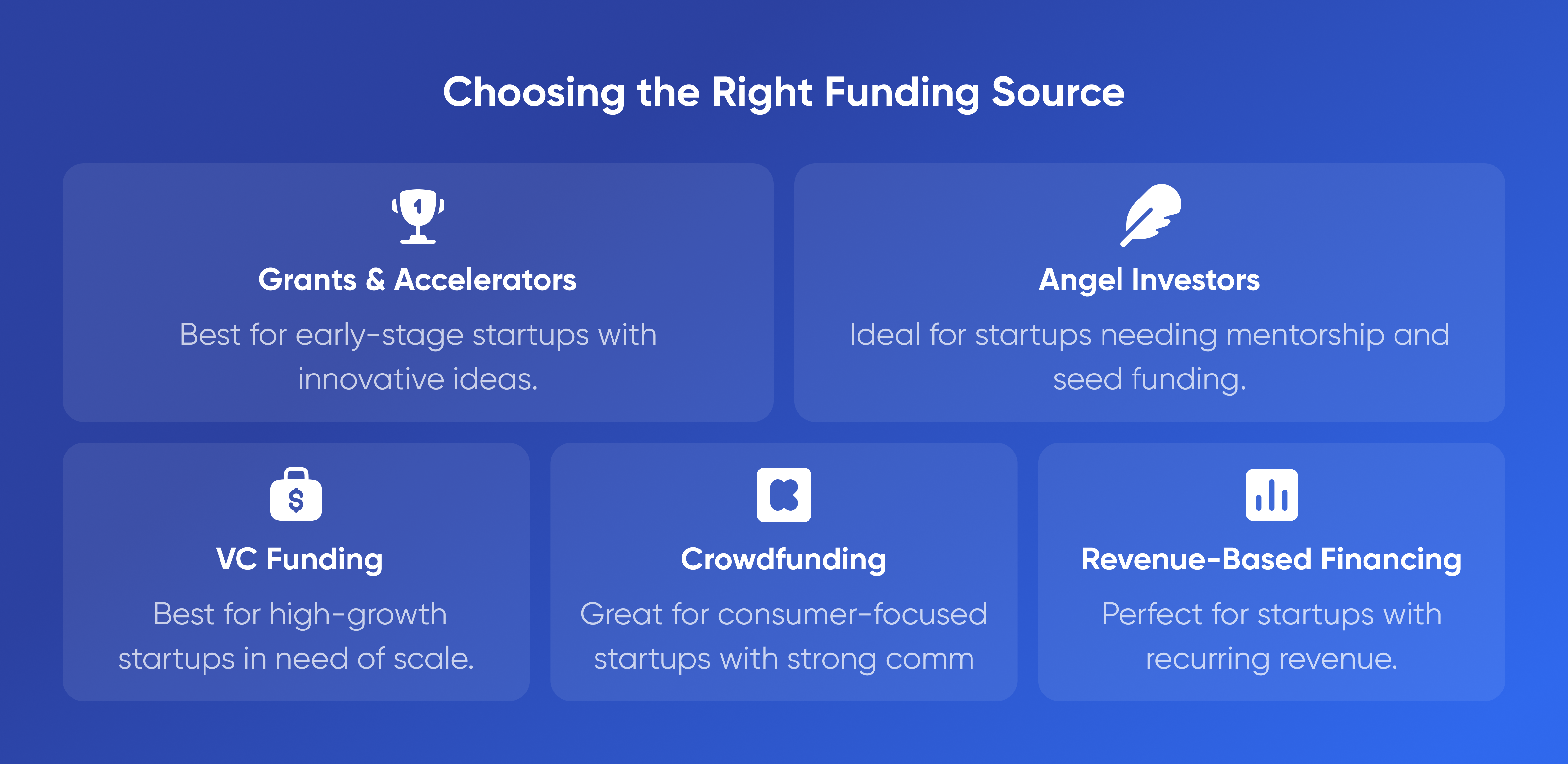Introduction
Raising capital is one of the biggest hurdles for startups. Whether you’re launching a SaaS platform, e-commerce business, or AI-driven app, securing funding is essential to scale, acquire customers, and build a strong product.
With multiple funding sources available—grants, accelerators, venture capital, angel investors, crowdfunding, and revenue-based financing—choosing the right one depends on your business stage and industry.
This guide will walk you through the best funding sources for startups in 2024 and how to increase your chances of securing capital.

1. Startup Grants: Free Money for Founders
What Are Startup Grants?
Grants are non-dilutive funding options, meaning you don’t give up equity in exchange for capital. Many governments, corporations, and foundations offer grants to encourage innovation and small business growth.
Best Startup Grants in 2024
✅ SBIR & STTR Grants (USA) – For tech and research-based startups.
✅ EIC Accelerator (Europe) – For deep tech and high-growth startups.
✅ Google for Startups Grants – For diverse founders and AI-based startups.
✅ AWS Activate Credits – Free cloud computing credits for early-stage tech startups.
✅ Local Government Grants – Check regional grants for business development.
💡 Tip: Grants are competitive. Prepare a solid business plan and clearly define how your innovation solves a real-world problem.
2. Startup Accelerators & Incubators
What Are Accelerators & Incubators?
Startup accelerators and incubators offer seed funding, mentorship, and networking opportunities to help early-stage companies scale.
Top Accelerators in 2024
✅ Y Combinator (USA) – Invests $500K for 7% equity in high-potential startups.
✅ Techstars (Global) – Focuses on various industries, including SaaS, fintech, and healthtech.
✅ 500 Global (USA & Asia) – Invests in global tech startups.
✅ Seedcamp (Europe) – Early-stage funding for European startups.
✅ Antler (Global) – Helps founders build and launch startups from scratch.
💡 Tip: Research the accelerator’s focus before applying. Many specialize in specific industries like fintech, SaaS, deep tech, or social impact.
3. Angel Investors: Early-Stage Funding with Mentorship
Who Are Angel Investors?
Angel investors are high-net-worth individuals who provide seed funding in exchange for equity. They often bring industry expertise and valuable connections to the table.
Where to Find Angel Investors
✅ AngelList – The largest online platform for startup investment.
✅ SeedInvest – Connects founders with accredited investors.
✅ Angel syndicates & networks – Groups like Tech Coast Angels, Golden Seeds, and Angel Capital Association.
✅ LinkedIn & Twitter – Many angels publicly share their investment interests.
✅ Local pitch events & networking groups – Join startup meetups to connect with potential investors.
💡 Tip: Angels invest based on traction, team, and market opportunity. Have a clear pitch deck ready.
4. Venture Capital (VC): High-Growth Funding
What Is Venture Capital?
Venture capitalists (VCs) fund high-growth startups in exchange for equity. VCs typically invest in startups that have strong traction, scalable models, and large market potential.
Where to Find VC Funding
✅ Crunchbase & PitchBook – Find VCs actively investing in your sector.
✅ VC Firm Websites – Look at firms like Sequoia, Andreessen Horowitz, Accel, and Bessemer Venture Partners.
✅ Warm Introductions – The best way to secure VC funding is through referrals from advisors, other founders, or angel investors.
✅ Startup Conferences – Events like TechCrunch Disrupt, Web Summit, and Slush are great for networking.
💡 Tip: VCs expect high returns (10X or more), so be prepared to show how your business can scale rapidly.
5. Crowdfunding: Raising Capital from the Public
How Does Crowdfunding Work?
Crowdfunding allows startups to raise money from thousands of backers in exchange for equity, rewards, or future product access.
Best Crowdfunding Platforms
✅ Kickstarter & Indiegogo – Best for product-based startups.
✅ Republic & Wefunder – Equity crowdfunding platforms for early-stage startups.
✅ StartEngine – Allows businesses to raise capital from everyday investors.
✅ GoFundMe – Ideal for social impact and non-profit projects.
💡 Tip: A strong marketing campaign and engaged community are key to crowdfunding success.
6. Revenue-Based Financing: Growth Without Equity Dilution
What Is Revenue-Based Financing?
Revenue-based financing (RBF) lets startups borrow capital and repay it as a percentage of revenue—without giving up equity.
Best Revenue-Based Financing Platforms
✅ Pipe – Provides upfront capital for SaaS startups based on future revenue.
✅ Clearco – Offers growth capital for e-commerce businesses.
✅ Lighter Capital – Non-dilutive funding for tech startups.
💡 Tip: RBF is ideal for startups with recurring revenue models like SaaS and e-commerce.
Conclusion: Choosing the Right Funding Source
Finding the right funding depends on your startup’s stage, industry, and growth model.
✅ Grants & Accelerators – Best for early-stage startups with innovative ideas.
✅ Angel Investors – Ideal for startups needing mentorship and seed funding.
✅ VC Funding – Best for high-growth startups in need of scale capital.
✅ Crowdfunding – Great for consumer-focused startups with strong community backing.
✅ Revenue-Based Financing – Perfect for startups with recurring revenue.
📩 Need help raising capital? Movadex helps founders connect with the right investors.
💡 Book a free consultation today to strategize your startup funding journey!




